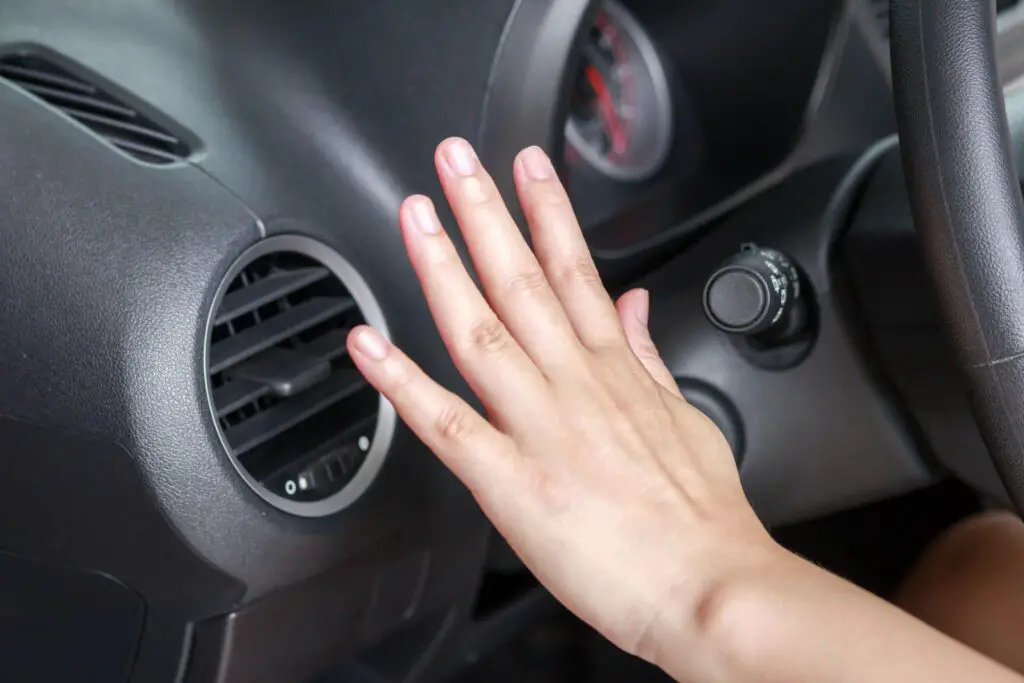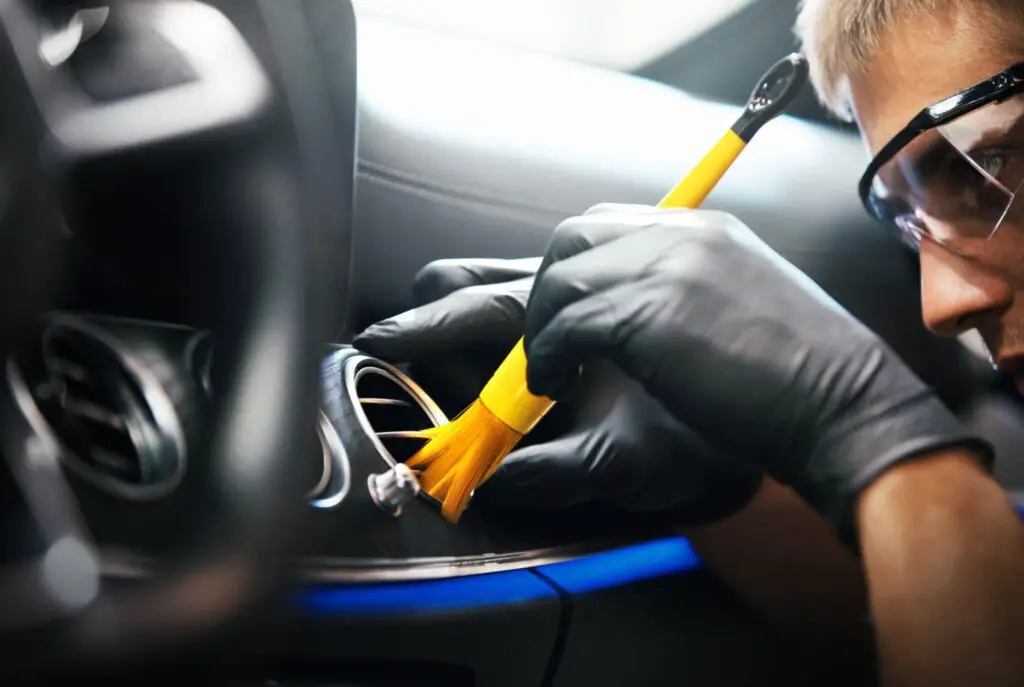Car air conditioning is vital for keeping passengers comfortable during hot weather, but it can be frustrating when the car AC stops blowing cold air after a while. Many different factors, such as low refrigerant levels, a malfunctioning compressor, or a clogged expansion valve, can cause this problem. To properly diagnose and fix the issue, it is important to understand the basic components and functions of a car’s AC.
Here we will look at the most common reasons why a car’s air conditioner stops blowing cold air and give you some troubleshooting and maintenance tips to keep your AC running smoothly.
Understanding The Components And Functioning Of Your Car’s AC System

A car’s AC includes several components that work together to cool the air inside the vehicle. These components include:
- Compressor: The compressor is the center of the AC. It compresses and pumps the refrigerant through the system and is responsible for pressuring and circulating it.
- Condenser: The condenser you will find at the front of the radiator, and its function is to release the heat absorbed by refrigerant. It also helps to cool and condense the refrigerant.
- Evaporator: The evaporator is inside the car, usually behind the dashboard. Its function is to absorb heat from inside the car, which causes refrigerant to evaporate and cool the air.
- Expansion valve: Expansion valve regulates refrigerant flow into the evaporator. It helps control the pressure and temperature of the refrigerant and ensures that the right amount of refrigerant flows into the evaporator.
In short, the AC works by absorbing warm air inside the car and cooling it by passing it over the evaporator. It pressurizes the refrigerant and circulates it through the system, releasing the heat absorbed by it through the condenser. Refrigerant flows through the expansion valve into the evaporator, where it absorbs heat from inside the car and cools the air. The cooled air is then blown into the car through the vents.
Note that all these components should function correctly and be in good condition for the AC to work properly.
What Are The Common Reasons Why Car AC Stops Blowing Cold Air After a While

Below are some common causes car AC sometimes works and sometimes it doesn’t:
- Low refrigerant levels: Refrigerant is the chemical that cools the air inside the car. If its level is low, it will not be able to cool the air effectively, and the AC will stop blowing air. This could result from a leak in the system or a malfunctioning compressor that cannot pump refrigerant through the system.
- Malfunctioning compressor: It is the heart of the AC system and is responsible for pressurizing and circulating refrigerant. If the compressor is working poorly, it will not be able to compress refrigerant and circulate it through the system, causing the AC to stop supplying cold air.
- Expansion valve clog: Expansion valve regulates refrigerant flow into the evaporator. If the valve becomes clogged, it will not be able to properly regulate the flow of refrigerant, and your AC to stop providing cold air.
- Leak in the system: If there is a leak in the AC, the refrigerant will be able to escape, and the system will not have enough refrigerant to cool the air. This can cause the AC to stop blowing cold air.
- Electrical issues: Electrical problems can be another problem. For example, a faulty relay or a blown fuse can prevent the compressor from turning on, causing the AC to stop contributing cold air.
These causes could be due to regular wear and tear lack of maintenance, or improper installation. Do regular check-ups on the system to help prevent the issues or detect them early to avoid more severe issues.
Troubleshooting And Maintenance Tips
Troubleshooting and maintaining your car’s AC will help prevent it from stopping to blow cold air and prolong the life of the system. Here are some tips for troubleshooting and maintenance:
- Check refrigerant levels: If your AC is not blowing cold air, the first thing to do is check the refrigerant levels. You can do this by using a refrigerant pressure gauge or taking your car to a mechanic. If the levels are low, it could indicate a leak in the system, which should be repaired immediately.
- Identify and fix leaks: If you suspect a leak in the AC, look for signs such as oil stains or refrigerant residue. These can be caused by a damaged hose or a malfunctioning component. If you find a leak, it’s important to have it repaired immediately to prevent further damage to the system.
- Properly maintain the AC system: Regular maintenance of the AC can help prevent problems from occurring. This includes things like replacing the air filter, cleaning the evaporator and condenser coils, and checking the belt and pulleys for wear and tear.
- Regular check-ups: Regular check-ups of the system can help detect problems early on and prevent them from getting worse. It’s a good idea to have your AC checked at least once a year, or as recommended by the vehicle’s manufacturer.
- Keep the interior clean: Keep the interior of the car clean, especially the air filter, it can help the AC work more efficiently and prolong the life of the system.
- Avoid using the AC in recirculation mode for long periods: when you use the recirculation mode for long periods, it may cause the evaporator to freeze, which can cause the AC to stop blowing cold air.
Implementing the above troubleshooting and maintenance tips can help keep your car’s AC running smoothly and prevent it from stopping to blow cold air.
Tricks To Stay Cool When Car AC Sometimes Works Sometimes It Doesn’t

Here are some helpful tricks and suggestions to stay cool when the AC is not working:
- Park in the shade: If possible, park your car in the shade to keep the interior cool. That can reduce the temperature inside the vehicle by as much as 20 degrees Fahrenheit.
- Use window shades: Reflective windows can block out the sun’s rays and keep the interior of the car cooler.
- Use portable fans: A portable fan can help circulate air inside the car, making it more comfortable for everyone.
- Keep windows slightly open: Keeping the windows slightly open can help increase airflow and reduce the temperature inside the car.
- Use a sunshade on the dashboard: A sunshade on the dashboard could help keep the dashboard and steering wheel cool to the touch.
- Cover the seats with a towel or a seat cover: This helps keep them cool and prevents them from getting hot and sticky.
- Use a wet towel or a spray bottle with water to cool down: Wetting a towel or a spray bottle with water and placing it on your skin or clothing can provide a cooling effect.
- Use a hand-held battery-powered fan: This can provide a cool breeze to help keep you cool when the AC is not working.
- Wear breathable clothing: Light-colored clothing can help keep you cool by wicking away sweat and allowing air to circulate around your skin.
- Avoid using electronic devices that generate heat: Laptops, tablets, and smartphones can generate heat, so try to avoid using them when the AC is not working.
Following these tips and suggestions can help you stay cool and comfortable when the AC is not working.
Parting Shot
The air conditioning system in a car is essential for keeping passengers cool in hot weather, but it gets depressing when the AC stops blowing cold air after a while. Many factors, such as a lack of Freon gas, a faulty compressor, or a clogged expansion valve. Regular maintenance, proper use, and check-ups are important to keep the system running smoothly and avoid costly repairs.
Now, If you’re wondering whether it’s safe to sit in your car with the air conditioner on, you can learn more from – Is it OK to Sit in Car with AC On?
You May Also Like:
Blown Fuse Car Won’t Start? Here’s What You Need to Know
Can I Apply Clear Coat the Next Day? The Ultimate Guide
The Essential Guide to Blown AC Fuse In Car Symptoms
What to Do When Your Battery Light Stays On After Key Pulled?


